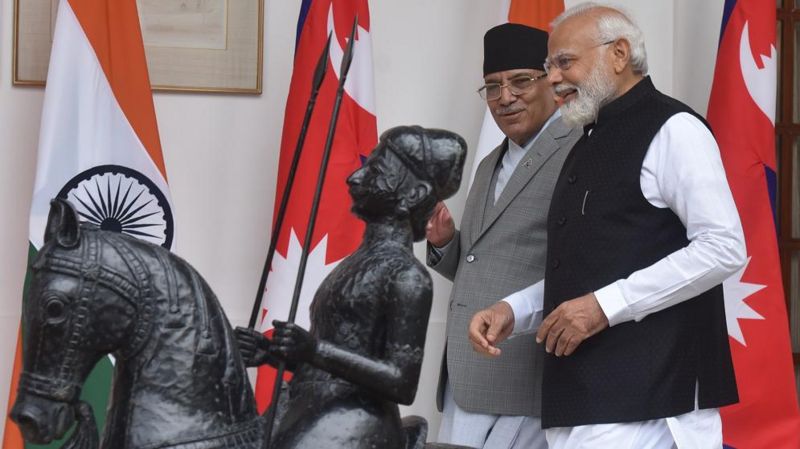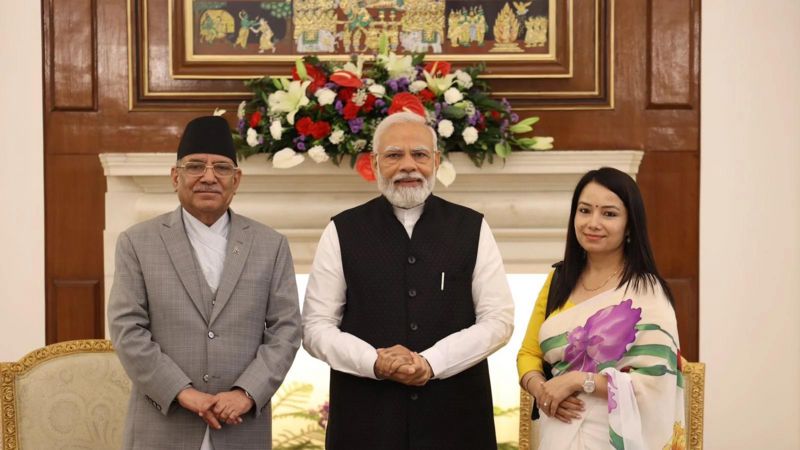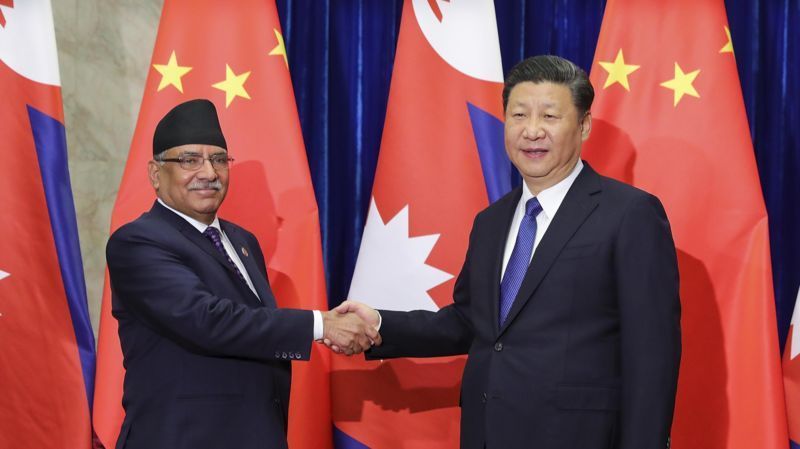Although Nepal and India reached some major agreements during Prime Minister Pushpa Kamal Dahal's visit to New Delhi last week, experts say the visit created more issues than it answered.
In a joint press conference with Prime Minister Prachanda, Indian Prime Minister Narendra Modi agreed to sign an energy trade agreement to acquire 10,000 MW of electricity from Nepal over a 10-year period.
In his speech, he also emphasized the importance of moving forward by resolving the Nepal-India boundary dispute. High-ranking government officials have described the visit as "fruitful," with major agreements signed.
Land-swap comments cause ripples
Prime Minister Dahal stated that his visit has provided a "clear direction for the future" of Nepal-India ties, and that key agreements have been reached on a number of subjects, including settling the border dispute.
Prime Minister Narendra Modi stated that he has committed to purchasing 10,000 MW of electricity from Nepal over the next ten years, emphasizing the importance of strengthening bilateral cooperation in energy and water resources.
What is a 'unparliamentary word'? 'Bangladesh model is not my proposal': Prachanda
What do experts think of the Foreign Minister's claim that Nepal is unaware of the 'Akhand Bharat' mural?
In his speech, he also emphasized the importance of moving forward by resolving the Nepal-India boundary dispute. High-ranking government officials have described the visit as "fruitful," with major agreements signed.
Land-swap comments cause ripples
Prime Minister Dahal stated that his visit has provided a "clear direction for the future" of Nepal-India ties, and that key agreements have been reached on a number of subjects, including settling the border dispute.Prime Minister Narendra Modi stated that he has committed to purchasing 10,000 MW of electricity from Nepal over the next ten years, emphasizing the importance of strengthening bilateral cooperation in energy and water resources.
What is a 'unparliamentary word'? 'Bangladesh model is not my proposal': Prachanda
Opposition leaders, however, have questioned the option of trading territory relating to the Kalapani, Lipulek, and Limpiyadhura sectors, which Nepal has updated on its map in New Delhi.
Prime Minister Prachanda said in the House of Representatives on Monday that, while he examined the patterns provided by some Nepali intellectuals, he did not present the alternative of exchanging Nepali land.
"The Bangladesh model is not my point," Prachanda stated in the House. This has been confirmed by intellectuals close to the opposition leader who highlighted the subject. The most important thing is to resolve the border issue."
He stated that establishing Kalapani, Lipulekh, and Limpiyadhura as Nepal's territory was the most important thing, and that he fulfilled his duties properly.
"The Prime Minister expressed his views without allowing Nepalis to debate the issue," he remarked. The Prime Minister's light-hearted approach to a topic of such long-term importance has sparked questions about his diplomatic ability.
Questions ranging from one-on-one meetings to religious pilgrimages
Prime Minister Pushpa Kamal Dahal 'Prachanda' has stated that he has held informal talks with the Indian side on the subject.
Prachanda believes that 'options' can be used to solve the border problem.
In the next ten years, India will import 10,000 MW of electricity from Nepal.
As an example, Upadhyay stated, "The visit has raised more questions than answers, so mutual mistrust and apprehension in bilateral relations continues to prevail." The utter disregard for the Enlightened Group's report has gravely exposed these questions. Our Maoist Centre leader's visit to a temple in Ujjain, which has been given a strong religious hue, has undermined his ideological and political standing even further.
In defending his decision to visit the Mahakaleshwar temple in Ujjain, he stated that the visit was motivated by the wishes of the invitees as well as his own.
Prachanda has stated that his visit to the Ujjain temple should be avoided unless he is in favor of religious neutrality and also participates in programmes of other religions.
Ajit Doval, India's security advisor, met with Prachanda, who arrived in New Delhi on Wednesday.
The Indian Security Advisor was accompanied by the Indian Foreign Secretary in the images posted about the meeting, but no official from the Ministry of Foreign Affairs was present with the Nepali Prime Minister.
Haribol Gajurel, the Prime Minister's Chief Political Advisor, stated that the prime minister and the Indian security adviser were supposed to meet alone, but his personal secretary attended the meeting as a different circumstance arose at the last minute.
"There was a situation when the Indian Foreign Minister went out and was about to meet the Indian National Security Advisor," Gajurel recalls. The Indian Foreign Secretary was also present. They couldn't instantly contact others after arriving.
Indian troops who had been to Nepal for a year under a 'informal arrangement' were to be recalled for nearly two decades.
Did King Mahendra permit the stationing of an Indian army in Kalapani?
According to Gajurel, the prime minister's recent visit has generated an atmosphere of trust by overcoming the frost in Nepal-India relations that has existed since 2019.
According to experts, such crucial high-level meetings should be retained in the institutional knowledge of the Ministry of Foreign Affairs, and for this, diplomats should be present.
CpN(UML) Chairman and former Prime Minister KP Sharma Oli stated in a parliament meeting on Monday that such meetings should follow protocol.
Prime Minister Prachanda told reporters in New Delhi that he had three one-on-one meetings with his counterpart Modi, which laid the groundwork for crucial understandings.
According to author Upadhyay, "the secrecy of the issues raised in those three discussions, as well as our Prime Minister's willingness to present them with importance, has had a negative impact on the agreements and agreements." It's not a good idea to start on a new path without first resolving previous issues."
Although it is one thing to demonstrate preparedness to conclude that the visit was a success by displaying numerous agreements, he believes that tangible results are required in Nepal-India relations rather than such symbolic scenarios.
'Nepal's increasing reliance on New Delhi'
Indian Prime Minister Narendra Modi stated in a joint press conference with Nepalese Prime Minister that Nepal will import 10,000 MW of electricity over the next ten years.
Prime Minister Dahal stated that the two countries' energy trade deal had been completed in all aspects and that it will be formalized soon.
India has decided not to purchase electricity generated by Chinese-funded hydroelectric projects in Nepal.
Prime Minister Pushpa Kamal Dahal 'Prachanda' has stated in parliament that he has discussed the question of acquiring electricity from 'global tender' projects in India.
Border dispute between Nepal and India: the Kalapani-Lipulek area was established 13 years ago.
Agreements were obtained during the visit on the 480 MW Fukot Karnali and 669 MW Lower Arun projects.
Ajaybhadra Khanal, a geopolitical observer, believes that Nepal has become "intricately dependent" on India in recent years.
Four aspects in Nepal-India ties are deemed 'indifferent' in Delhi.
Some of the accords negotiated by Prime Minister Prachanda in New Delhi, according to Khanal, are also targeted towards increasing dependence on India. Previously, it could be done here and there while keeping its national interests in mind. That is no longer the case. "
Previously, India had more capacity to take advantage of Nepal politically, but it now has greater ability to take advantage of it in sectors such as infrastructure, he said.
"It was under the influence of Indian companies, like petroleum pipelines, hydropower trade, and the catchment area of Nepal's big rivers," he says. Financial systems are being modified as well. India has the ability to exploit it, but Nepal does not."
Khanal, who sees it as a new challenge in Nepal's foreign policy, believes Nepal must make serious measures to protect its national interest and security.
"Nepal is gradually losing its ability to make independent decisions in areas such as development, domestic politics, and investment in the national interest," he stated. That is why Nepalis should debate the issue using facts and data. Serious research on national security challenges is required to ensure that our independence in decision-making is preserved.
China's concern over Delhi visit
Nepalese officials have stated their desire to retain close relations with both India and China, as well as to attract investment from both nations in fields such as infrastructure construction.
However, recent geopolitical worries appear to be making it harder for Nepal to make choices on some of these issues.
An article published in China's Global Times this week after Prime Minister Prachanda returned home stated that Nepal will benefit from a balanced foreign policy between India and China.
According to the article, many actions have been made in recent years to sour relations between Nepal and China.
As an example, Chinese scholar Zhang Xiadong stated that it would not have been able to pass without India's assistance.
Nepal and China: Nehru clarified after Beijing apologized to Kathmandu.
The article notes that India has prohibited the purchase of power from projects created with Chinese funding, and that Nepal is facing greater challenges in going forward on the path of development by remaining neutral between India and China.
Upadhyay stated that India, with the help of Western countries, has developed a policy to counteract "unfair" Chinese influence in Nepal in the face of a changing regional, strategic, and security environment.
"The problem with this concept is that what others think is unfair may not always be the case from Nepal's point of view," he explained. China is one of Nepal's two largest neighbors, and Nepal wishes to maintain solid relations with it in the most mutually advantageous manner possible.
Upadhyay warned that denying Nepal the chance to make institutional and autonomous decisions through Indian and Western policy forums would be detrimental to regional peace and security.
"India's proximity to the West, combined with China's emphasis on Nepal as a bridge connecting South Asia," he noted. The sensitivity displayed by our political leadership during Prime Minister Prachanda's visit to India was lacking mindset of such huge challanges."
What is the impact of 'India's rising dominance' in Nepali electricity on Chinese investment?
If you have any problem regarding this comment us, we will help you, if you like this post share it with your friends.
Visit our website to get more information about the different topic:






0 Comments